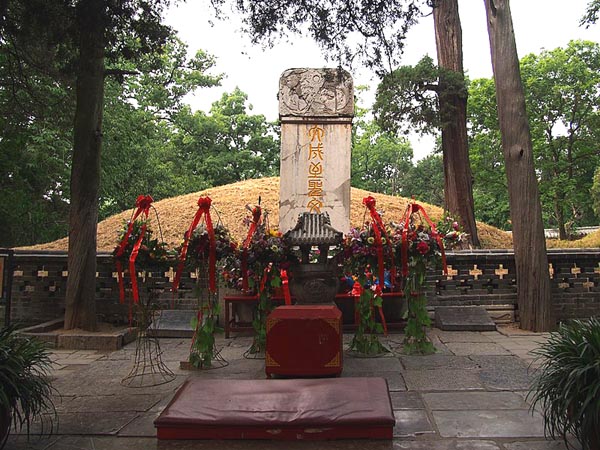 |
| "A passage was dug into the grave..." This mound is the modern tomb of Confucius (Wikipedia) |
Note: This story teaches us that even an emperor should not trifle with the powers of a great scholar!
Get Ready: Do you believe in ghosts, or in curses from beyond the grave? Do you feel that the burial places of our ancestors should be treated with special respect?
The justly-revered first emperor of China, Qin Shi Huang--from whose very name we get the word China--unified the nation for the first time, and expanded its borders. He also enacted major economic and political reforms (including unification of the country's various writing systems); consolidated the Great Wall; and built a massive new national road system.
But some of his reforms came at a price. Over a century after the Qin Emperor's death the Han Dynasty official Sima Qian reported in his Records of the Grand Historian the "burning of books and burying of scholars"--namely, the live burial of some 460 Confucian scholars in 212 BCE.
Historians today doubt the details of this story, but it is certain that Qin suppressed Confucianism in favor of his own official governing philosophy, called Fajia or "Legalism."
This anti-Confucian stance gave rise to a legend among the people.
The cause of Qin's death at age 49 is unknown (some say he was poisoned), but it is certain that it took place at the palace in Shaqiu Prefecture (in today's Xingtai City, Hebei)--a place that has been built into the legend.
On his last tour through his empire, they say, Qin Shi Huang came to Qufu and the tomb of Confucius (who had died over two and a half centuries earlier). Against the advice of his officials, the Emperor demanded that the tomb be opened so he could see what was inside.
A passage was dug into the grave; in the main chamber they found a coffin made of new-looking wood. But in an inner chamber stood a bed, a table with books, and clothing, looking as though someone were living there.
The emperor sat down on the bed and, looking down, saw a pair of red silk shoes. In good humor, the Emperor put on the shoes, picked up a bamboo staff leaning against the wall, and walked out.
Suddenly, there appeared before his eyes a tablet reading:
O'er kingdoms six Qin Shi Huang his army led,
To ope my grave and find my humble bed;
He steals my shoes and takes my staff away
To reach Shaqiu--and his last earthly day!
Alarmed, the Emperor had the grave closed again, but died suddenly when he reached Shaqiu.
No wonder Qin insisted he be buried guarded by the protection of the Terra Cotta Army!
--------- Read more: https://en.wikipedia.org/wiki/Confucius
- Read "A Legend of Confucius" FREE online
Practice: Match the term to its definition below:
- chamber
- coffin
- enacted
- humble
- justly
- reforms
- revered
- stance
- suppressed
- terra cotta
- accurately; fairly
- highly respected
- a type of earth; clay
- position; point of view
- ways of improving something
- a box for burying a person
- put into effect
- lowly; not proud
- a room
- put down; quelled
Answers are in the first comment below.
Submitted to the Shenzhen Daily for September 23, 2022


Answers to the Practice: 1. i; 2. f; 3. g; 4. h; 5. a; 6. e; 7. b; 8. d; 9. j; 10. c
ReplyDelete